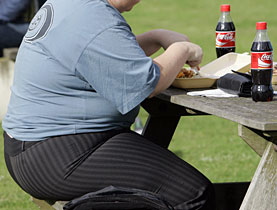Big brands take small steps to healthier foods

Swiss food producers are pledging to offer healthier food options and temporarily refrain from advertising to children as part of a public health campaign.
The Federal Health Office said on Tuesday that as part of its healthy eating campaign, food giant Nestlé and supermarket chain Coop had agreed to reduce salts or fats in products. Vending machine company Selecta said it would offer healthier choices to children under 15.
The goals of the campaign are to encourage companies to commit to reducing the salt and fat content in their food products, to offer more balanced foods in schools and to give up advertising aimed at children.
By the end of next year, Nestlé has committed to reducing the saturated fat content in its Findus frozen food range by 30 per cent. By the end of 2015, the manufacturers have pledged to reduce the salt content in the same range by ten per cent.
But as Findus is just one of Nestlé’s more than 6,000 brands, swissinfo.ch asked health office spokeswoman Mona Neidhart whether such measures were more cosmetic than meaningful.
“You can obviously say that it is a drop in the ocean and I can’t say what these changes [salt and fat reductions] make in overall consumption in Switzerland, but it is important that the food industry is included in responsibility for nutrition,” she said.
“It is important that they are active themselves and accept their responsibility and offer food products which contribute to a balanced diet.”
First steps
Steffi Schlüchter, a dietician from the Swiss nutrition association, said a ten per cent reduction in salt was a first step.
“This is a small step but necessary to reduce total salt intake. The decrease in salt content of pre-packaged products must be gradual to ensure that consumers adhere to it,” she told swissinfo.ch.
“It is very important that such companies are interested in this type of problem and have a proactive attitude. Maybe later on, smaller companies and restaurants will follow.”
Coop said in a statement on Tuesday it aimed to reduce the salt content in 300 own-brand convenience foods by the end of 2012.
Spokeswoman Denise Stadler said Coop had already moved to reduce salt in its breads in 2009 and sugars in yogurts and cold desserts in 2010. She said the latest move would target pre-prepared meals such as pizzas and salads by replacing sunflower oil with rapeseed oil in dressings, for example.
She said some products lent themselves more to reducing certain ingredients than others.
“With bread, it’s not that difficult to reduce salt and still keep the taste, but with other products like cold meats, it’s more difficult. It’s very important to do everything possible to keep the recipes at a high quality, otherwise people won’t buy it if the taste suffers.”
Questions of advertising
The health office also announced that Danone, Kraft Foods, Intersnack, Procter & Gamble and Zweifel Pomy-Chips had joined the Swiss Pledge initiative, founded last December by Coca-Cola, Kellogg, Mars, Nestlé, PepsiCo and Unilever.
Swiss Pledge replicates the commitments of a similar European Union pledge and requires the food and non-alcoholic beverage producers to cease advertising their products to children under 12.
Ines Egli from the Institute of Food Science and Nutrition at the Federal Institute of Technology Zurich (ETHZ) said numerous studies had shown that advertising targeting young people had significant effects on consumption of products.
“So I think if companies are voluntarily reducing advertising targeted at young people, that is a good thing,” Egli told swissinfo.ch.
But Neidhart pointed out that the Swiss Pledge promises were limited to the end of 2011, and as such could be cancelled from “one day to the next”.

More
Health insurance
Keeping it tasty
Neidhart said other measures may have a more lasting effect for practical reasons.
“When for example Coop says they will now use less sugar in their breakfast range, that means they haven’t just cut the sugar – the entire recipe has been adapted to keep the taste so that customers still enjoy it,” Neidhart said.
“They have carried out tastings and it’s probable that these new recipes are here to stay.”
Stadler said Coop didn’t go out of its way to advertise reduced salt and sugar on its products for fear that customers might not buy them.
“Having less salt is not really a quality aspect like having more vegetables on it or it being more fresh,” she said. “We don’t say ‘buy this pizza, it’s less salty’ because maybe people will misunderstand and think it tastes bad.”
A sedentary lifestyle, a lack of physical activity and an unbalanced diet have now become part of our society’s lifestyle. This is contributing to the increase in certain “lifestyle diseases” such as cardiovascular disease and diabetes.
According to the World Health Organization, there is convincing evidence that the consumption of high levels of high-energy foods, such as processed foods that are high in fats and sugars, promotes obesity compared with low-energy foods such as fruits and vegetables.
The amount of dietary salt consumed is an important determinant of blood pressure levels and overall cardiovascular risk.
Current global levels of 9-12 grams of salt consumed a day are well above the recommended daily intake of 5 grams.
High consumption of saturated fats and trans-fatty acids is linked to heart disease; replacement with polyunsaturated vegetable oils lowers coronary heart disease risk.
The Federal Health Office’s National Programme on Diet and Physical Activity runs from 2008-2012. actionsanté is an element of that programme.
actionsanté has been proactive in helping companies work out what commitments they can make by getting them to sign “Declarations of Intent”.
Actionsanté began in May 2009 and has signed up 15 partners to date, including major multinational consumer goods companies, such as Unilever, Kraft Foods and Nestlé.
Switzerland’s two largest retailers, Coop and Migros, were part of the scheme from the beginning.

In compliance with the JTI standards
More: SWI swissinfo.ch certified by the Journalism Trust Initiative













You can find an overview of ongoing debates with our journalists here . Please join us!
If you want to start a conversation about a topic raised in this article or want to report factual errors, email us at english@swissinfo.ch.